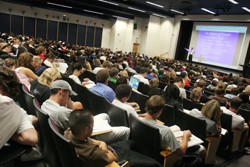When students offer academic advice to others, one of the most commonly overheard statements might be about a teacher’s grading scale, one student steering the other away from a former professor because he or she is a “”hard grader.””
While the UA Academic Index lists a variety of topics about grading scales, it fails to explain the UA’s stance on grade inflation: When is an 89.5 an A or a B, and why are some professors more lenient than others?
Although some instructors are willing to bend the rules for students, instructors like Reed M. Peterson with the department of East Asian Studies are disinclined to bump up grades, even if it leaves them with an unpopular stance among students and
administrators.
When asked why he believes some teachers are eager to, for example, call an 89.5 percent a 90 percent, Peterson said there are a variety of factors involved.
“”Some instructors are more focused on the feelings and emotions of students than others, and unfortunately, let that get in the way of providing an education,”” he said. “”An education requires performance, and if emotion is privileged over learning, there is a tendency to give ‘mercy’
grades. This does the student a great disservice, because it teaches the student that mediocre performance will be
rewarded.””
Additionally, Peterson notes that he has seen instructors who are “”afraid”” of their students, and, in looking to avoid quarrels, will give a student’s grade an extra, unwarranted boost. He said that professors are more concerned with befriending students rather than grading their work based on their precise performance. In a university setting where Peterson believes “”opinion has replaced reason, and feelings have replaced facts,”” grade inflation is not surprising to him – especially with the reluctance to hold college students to an elevated benchmark for scholastic strictness.
If some view grade inflation as a matter of opinion, Peterson believes the issue is far more serious than that – more akin to cheating or a violation of academic integrity than anything else.
“”Any form of awarding a grade that is not based solely on the actual performance of the student is dishonest and denigrates the educational process,”” he said. “”It’s like taking payment for goods that were not delivered.””
Those who think Peterson refuses to change grades out of inflexibility might want to instead consider the deeper reason for why he chooses this method. Peterson says that he feels it is immoral to show students that, for lack of hard work, they will be “”coddled and rewarded”” when they have not put in the necessary time and effort to obtain a grade.
“”My philosophy is essentially, ‘Your choices; your consequences,’ “” Peterson said. “”College students are not small children and should be held to adult expectations if they want to have adult privileges. ÿ
In the real world, your boss won’t give you a raise even though you failed to perform up to the established standard.””
Peterson explained that while there are many individuals who have unfairly received their high school diplomas for little work, there are equally as many college students who will receive a diploma from the UA who “”aren’t ready for university work.””
Peterson’s reasoning comes not out of a misunderstanding of his students, but his feeling that, in allowing people to squeeze by, uneducated individuals are thrown into the work force. He cites the practice of “”graduating uneducated students”” as the reason why the value of a college diploma simply isn’t what it was a decade ago.
“”Naturally, it varies by major, but it is far too easy to go to college and get a diploma these days,”” he said.
“”The only way to rectify this and make a college education worth the time and tuition is to reinstate rigorous standards for both admission and grading,”” he said.
The bottom line? “”The answer is to make it more difficult to get into college and to graduate from college,”” Peterson said.
Much of his interpretation, he explains, comes from the fact that his true desire is for students to do well in their coursework. Peterson explained that he likes to make himself an available resource to students if they are struggling, noting that, “”I don’t just throw them out there and bring the hammer down if they aren’t up to standard.””
But before students think that Peterson does not remember what it was like to be an undergraduate, students should think again.
“”By far, the best professor I had as an undergraduate or a graduate was unpopular with students,”” he said.
“”He helped me because he didn’t settle for mediocrity or weak scholarship, and I am a better scholar and a better person because of it.””









